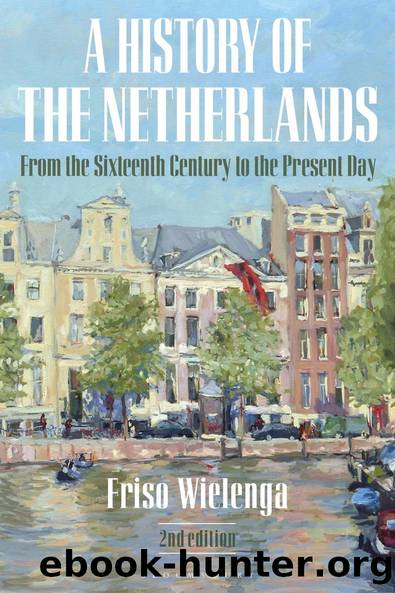A History of the Netherlands: From the Sixteenth Century to the Present Day by Friso Wielenga

Author:Friso Wielenga [Wielenga, Friso]
Language: eng
Format: epub
Tags: History, Europe, Western, Modern, General, Renaissance, 20th Century
ISBN: 9781350087323
Google: -JywDwAAQBAJ
Amazon: B07Y4V8LRJ
Goodreads: 52249701
Publisher: Bloomsbury Academic
Published: 2019-10-03T00:00:00+00:00
A small neutral power with a big empire
After the end of its United Kingdom in 1830, the Netherlands had to finally accept its position as a minor player. The traditions that had evolved since the seventeenth century could be revived in the renewed quest for a place in international relations and new instruments for pursuing national interests. In the past, the approach had always been to safeguard shipping and trading interests, which was best achieved through an international balance of power. In the international constellation of the second half of the nineteenth century this meant both avoiding any involvement in conflicts between nations, and increasingly emphasizing free trade. After all, the Netherlands profited from the growing liberalization of world trade, as we saw in the preceding section. The importance of good relations with both the British and the Germans contributed to the need for the Dutch to maintain a neutral course. British naval might was the only way to guarantee freedom of the seas and the security of the Dutch East Indies, and this made it essential to remain on good terms with Great Britain. At the same time, one-sided British orientation had to be avoided. The show of strength by Prussia (the German Empire from 1871) and growing economic engagement with Germany created a growing awareness of dependence in the Netherlands, and also the importance of maintaining good relations with the Germans.
During the 1860s, the Netherlands had watched the emergence of Prussian power with concern, and worries as to whether Prime Minister Otto von Bismarck also had surprises in store for the Netherlands were frequently aired. To pursue a consistent policy of neutrality was not easy because, through the province of Limburg and the grand duchy of Luxembourg, the country was part of the German Confederation and â whether it wanted to be or not â was involved in developments in it. The Dutch were pleased when, after British mediation, the institutional ties between Limburg and Luxembourg on the one hand and Germany on the other were cut in 1867. Relief in the Netherlands that Luxembourg and Limburg were now outside the North German Confederation was short-lived, however, as fears of becoming a victim of Prussian power intensified again with the FrancoâPrussian War (1870â71). After that war, the Dutch anxiety gradually abated and it became clear that Bismarck had an interest in Dutch neutrality in the light of his policy of maintaining a European balance of power.83 But of course that did nothing to alter the vulnerability of the Netherlands â in fact, it increased because of the DutchâGerman economic involvement discussed above, which took shape during these decades.
The axiom that an equal distance from each of the major European powers had to be maintained appeared to be briefly in danger around 1900. In 1880â81, during the so-called First Boer War, the British tried to settle their scores in South Africa with the two small republics of Transvaal and the Orange Free State and annex them to the British colony there.
Download
This site does not store any files on its server. We only index and link to content provided by other sites. Please contact the content providers to delete copyright contents if any and email us, we'll remove relevant links or contents immediately.
| Belgium | France |
| Germany | Great Britain |
| Greenland | Italy |
| Netherlands | Romania |
| Scandinavia |
Room 212 by Kate Stewart(5105)
The Crown by Robert Lacey(4807)
Endurance: Shackleton's Incredible Voyage by Alfred Lansing(4769)
The Iron Duke by The Iron Duke(4349)
The Rape of Nanking by Iris Chang(4203)
Joan of Arc by Mary Gordon(4101)
Killing England by Bill O'Reilly(3996)
Say Nothing by Patrick Radden Keefe(3975)
I'll Give You the Sun by Jandy Nelson(3429)
Shadow of Night by Deborah Harkness(3361)
Hitler's Monsters by Eric Kurlander(3329)
Mary, Queen of Scots, and the Murder of Lord Darnley by Alison Weir(3207)
Blood and Sand by Alex Von Tunzelmann(3195)
Eleanor & Park by Rainbow Rowell(3153)
Darkest Hour by Anthony McCarten(3119)
Margaret Thatcher: The Autobiography by Thatcher Margaret(3080)
Book of Life by Deborah Harkness(2932)
Red Famine: Stalin's War on Ukraine by Anne Applebaum(2929)
The One Memory of Flora Banks by Emily Barr(2857)
